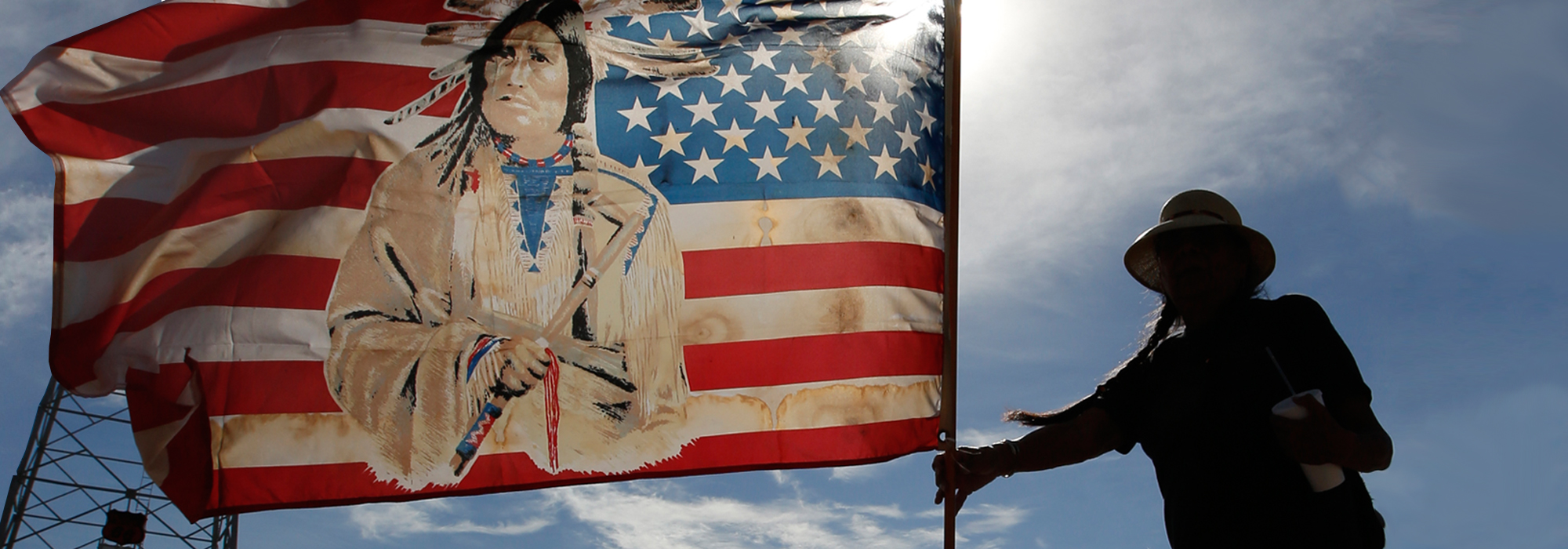
Native Americans and Alaska Natives, as the Indigenous peoples of America, are watching the US presidential election closely, but what happens on November 8 also matters for Indigenous peoples around the world. As a global super power, other nations look to the US when formulating their positions.
President Barack Obama has advanced Indigenous rights in his country by reversing the original American position against the United Nations Declaration on the Rights of Indigenous Peoples (UNDRIP) and ultimately endorsing it. Having a leader who will advance Indigenous rights matters to the Indigenous peoples of America. One needs only to look at Obama’s decision to reject the Keystone XL pipeline and the current situation at Standing Rock, North Dakota, to see why. Recent advancements in Indigenous rights as human rights require leadership and a commitment to uphold them.
The Republican Party, in its platform, seeming to be appealing to Native American voters by promising the following, among other things:
- more opportunities for self-determination and self-government, especially in economic opportunities, education, health services and new infrastructure on Tribal lands;
- consultation before new policies that affect Tribal land are implemented; and
- access to federal programs for the preservation of cultures and languages.
In short, the stated goal of the Republican Party platform is to “empower American Indians through self-determination and self-governance policies … without undue federal interference.”
Independent of the Republican Party platform, Donald Trump has said things that are unfavourable to the Indigenous peoples of America. First, he said that he will revive the Keystone XL pipeline project if elected, a promise that the Indigenous peoples would argue is contrary to the Republican platform to empower American Indians through self-determination. Indigenous peoples’ rights to self-determination are upheld in article 3 of the UN Declaration on the Rights of Indigenous Peoples, while article 18 guarantees the right to participate in decision making on matters affecting the Indigenous peoples’ rights. Unilateral approval of the Keystone XL pipeline project would be inconsistent with these and other articles in the declaration that guarantee the right to self-determination.
Second, to say that some of Trump’s past generalizations about and characterizations of Native American peoples are derogatory would be an understatement. Name-calling with the intent to intimidate seems to be one of Trump’s trusted tactics for getting what he wants. In the 1990s, it was ensuring the profitability of his casino empire by attacking possible competition. He also characterized the Mohawks living in Upstate New York as having long criminal records and ties to the mob, through advertisements he financed showing images of cocaine lines and syringes, with the caption, “Are these the new neighbours we want?” Further, he stated that the Mashantucket Pequots, the Connecticut tribe that opened the successful Foxwoods Casino in 1991, were not real Indians because they don’t look like Indians, seemingly ignorant of the rigorous process the Indigenous peoples must adhere to in the US to achieve Tribal status.
In 2016, Donald Trump called senior United States senator and Democratic Party member, Elizabeth Warren, “Pocahontas,” and mounted a Twitter campaign questioning her Native American heritage. Whether or not Elizabeth Warren is Native American is irrelevant here. Credited for fostering peaceful relations between the English and some of the Algonquian Tribes in what is now Virginia during the early 1600s, Pocahontas died in England of small pox at a relatively young age. Trump’s use of the name Pocahontas in this pejorative manner against Warren takes away from our collective understanding of Pocahontas as a bridge builder and peace maker.
Trump’s actions — the ads depicting the Mohawk peoples as criminals, the assertions that the Pequots do not look like Indians and repeatedly calling Elizabeth Warren “Pocahontas”— are not only undignified, they are simply beyond the pale.
Hillary Clinton’s campaign website refers to the “sacred trust” that the United States has with Native Americans. “She is committed to strengthening and building on the government-to-government relationship between the United States and Indian tribes, and believes the United States should fulfill its treaty obligations and trust responsibilities to Tribal Nations,” reads the site.
Clinton appeals to Indigenous voters in America by promising the following things:
- ensure meaningful consultation and empowerment, including appointing Native Americans to key federal agencies and the Supreme Court;
- protect Tribal assets and resources and resolve long-standing disputes;
- strengthen public safety and justice in Indian country;
- combat drug and alcohol addiction;
- increase opportunities for youth;
- ensure high quality education for youth;
- ensure that Tribal communities have improved health care; and
- fight for Native American veterans.
According to Clinton’s website, as Secretary of State under Obama, she supported the United Nations Declaration on the Rights of Indigenous Peoples. As a senator from New York and as first lady, Hillary Clinton took concrete steps, legislative and otherwise, to promote health care, women’s rights and children’s rights for Indigenous peoples in America.
Both Donald Trump and Hillary Clinton are conspicuously silent regarding Standing Rock, which is a noteworthy silence for the Indigenous peoples of America. Currently, the Standing Rock Sioux, a Native American Tribe in what is now North Dakota, is protesting the US$3.7 billion pipeline project, as it will traverse their burial and archeological sites and could pollute their main water source. Indeed, despite the promises made in both the Democratic and Republican Party platforms, the candidates themselves have remained remarkably silent on all issues facing Indigenous Americans. Silence speaks volumes, and this election could prove to matter to the Indigenous peoples of America, more because of what has not been said than what has been said.
If Hillary Clinton is elected, however, her past actions suggest that she will be a president who is thoughtful and methodical in her approach toward Indigenous peoples. If Donald Trump is elected, his past actions suggest that he will be a president who obfuscates the real issues and solutions for Indigenous peoples by manufacturing chaos through name-calling and intimidation.
As Indigenous leaders and some heads of state grapple with the meaningful implementation of the United Nations Declaration on the Rights of Indigenous Peoples, they will likely turn to the US, a global super power, when considering their positions. In contrast to Hillary Clinton’s informed, dignified diplomacy, Donald Trump’s unpredictable, erratic and ill-informed actions will likely not bode well for Indigenous peoples of the world. Trump’s approach is one of inflammatory chaos. If I could vote, I would vote for Hillary Clinton.
Photo: Jennell Downs, with the Kickapoo Tribe of Oklahoma, puts up a flag at the State Capitol in Oklahoma City during a protest against the Dakota Access Pipeline, Monday Oct. 31, 2016. Photo by Steve Gooch, The Oklahoman.
This article is part of The US Presidential Election special feature.
Do you have something to say about the article you just read? Be part of the Policy Options discussion, and send in your own submission. Here is a link on how to do it. | Souhaitez-vous réagir à cet article ? Joignez-vous aux débats d’Options politiques et soumettez-nous votre texte en suivant ces directives.







